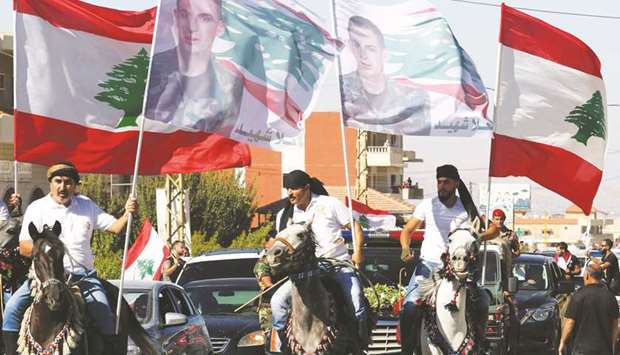President Michel Aoun and Prime Minister Saad Hariri took part in an official ceremony to honour the men at the defence ministry in Yarze, outside Beirut, which was also attended by grieving relatives.
The coffins of the men, draped in the Lebanese flag, were marched into the ministry courtyard by soldiers as sobbing family members dressed in black looked on.
The remains of the soldiers were retrieved from the border region last month after a battle against IS in the area that ended with an evacuation deal.
“Our joy in the victory over terrorism remains sorrowful, for we were hoping to free you unharmed from the terrorists and return you to your army and your families,” said army chief General Joseph Aoun.
Under the deal that ended the operation, surrendering IS fighters led Lebanese authorities to the site of the remains.
DNA tests this week confirmed that they belonged to the soldiers, most of whom were kidnapped from the Lebanese town of Arsal in August 2014.
They were among a group of 30 troops and police kidnapped by IS and Al Qaeda’s former Syrian affiliate in 2014, 16 of whom were released in a prisoner swap the following year.
The families of the remaining soldiers waged a lengthy campaign pressing the government to obtain information about their missing loved ones.
The army said the missing troops were its “top concern” in its offensive against an estimated 600 IS fighters in the hilly border region.
The deal that ended the assault saw IS fighters and some civilians evacuated to eastern Syria. It has been controversial in Lebanon.
Yesterday, Hussein Youssef, father of one of the killed soldiers and de facto spokesman for other relatives, urged accountability for anyone who had “trifled with the dignity of Lebanon, the country, the army and the lives of the soldiers.”
The soldiers, from different parts of the country, will be buried in their hometowns in separate ceremonies.
Lebanon’s government has declared the day a national holiday, and the streets of the capital were virtually empty with public institutions but also most shops closed for
the day.

